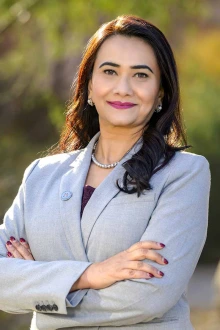Hina Arif elected to AAMC women’s leadership group
Hina Arif, MD, assistant dean for Women in Medicine and Sciences and vice chair of Clinical Affairs in the Department of Medical Imaging at the University of Arizona College of Medicine – Tucson, was elected as a member-at-large for the Group on Women in Medicine and Science at the Association of American Medical Colleges.
The group “advances the full and successful participation and inclusion of women across the spectrum of academic medicine and biomedical research by addressing gender equity, recruitment and retention, awards and recognition and career advancement.”

Hina Arif, MD
Photo by Kris Hanning, U of A Health Sciences Office of Communications
“To be elected as a member-at-large of the AAMC Group on Women in Medicine and Science is a privilege and honor,” said Arif, who is also chief of abdominal radiology and a professor of medical imaging, medicine, pathology and surgery at the College of Medicine – Tucson.
“The new role clearly reflects my unwavering commitment and dedication to promoting women in academic medicine and enables me to work on leadership development, faculty retention, work-life integration, career progression and institutional policies at the national level.”
Arif, whose term on the steering committee began at the end of 2024, said her role will entail collaborating on national strategies as well as contributing to programming and initiatives. The committee plays a key role in AAMC annual conference, Learn Serve Lead, and event planning, organizing GWIMS sessions at association conferences and supporting professional development workshops.
The role also involves working with the association’s leadership and institutional leaders to align on broader goals and engaging with medical schools and health systems to implement best practices.
“This instrumental role on the national stage will bring the University of Arizona College of Medicine – Tucson into the national spotlight,” said Arif. “Exposing us to national leaders and best practices will strengthen our networks and collaborations. I can bring innovative programs and policies back to the U of A, which can lead to new partnerships, funding sources and faculty development programs.”
Arif joined the association in 2022, joining both the Group on Women in Medicine and Science and the Group on Diversity and Inclusion, and the Group on Faculty Affairs in 2024.
“This role will also strengthen mentorship and pipeline development by contributing to national mentorship programs, helping to grow future women leaders at the U of A and on a national level while also attracting elite faculty, trainees and students to the University of Arizona and making a difference for women in medicine and science,” she said.
Arif joined the College of Medicine – Tucson in 2011. Her research focuses on advancing magnetic resonance technology in gastrointestinal and genitourinary oncology and developing fast and efficient magnetic resonance protocols for acute and complex abdominal pathologies.
Arif is a clinical researcher with expertise in magnetic resonance imaging. She contributes to the University of Arizona Cancer Center and the Clinical and Translational Sciences Research Center by supporting all oncologic imaging services. Arif also serves as co-investigator on various gastrointestinal and genitourinary clinical trials.
In addition to her work at the association, Arif is a member and expert panelist of the American College of Radiology and is a member of the Society of Abdominal Radiology.
Arif encourages early-career women doctors and faculty members to pursue leadership skills through career development initiatives and programs offered both locally and nationally.
“You should actively seek both mentorship and sponsorship, as mentors offer advice while sponsors accelerate advancement,” Arif said. “Establishing a strong professional network, such as those in national subspecialty societies or institutions, such as the AAMC Group on Women in Medicine and Science, can lead to meaningful opportunities.”

